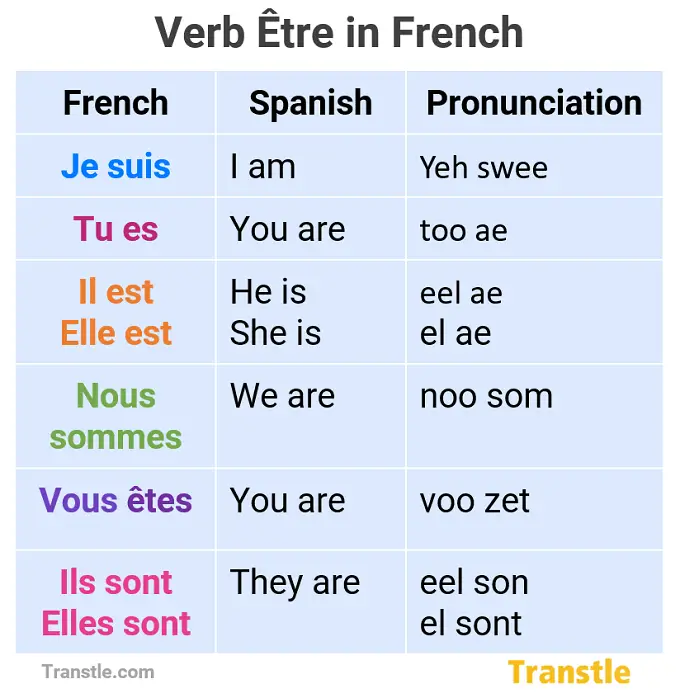Verb Être in French: Use, Conjugation, Examples, Exercises

What is a verb
A verb is a word that expresses an action, an act, a movement, or a state. They refer to the activities done or experienced by people, animals, or things and their states of being.
Example:
|
The verb Être
The verb être means to be, it is used to express the characteristics, states, qualities, or location of people, animals or things, for example “Je suis une femme” – “I am a woman”, “il est en france” – “he is in france.”. Learning this verb is necessary to be able to build complete and basic sentences in French.
This is a simple and complete guide that will help you understand quickly how this verb works.
Table of Contents
Present Tense Conjugation (Le Présent)
The verb “être” is irregular, so you’ll need to memorize its forms. Here is the complete conjugation for the present tense, the most common form you’ll use.
| Francés | Inglés |
|---|---|
| Je suis | I am |
| Tu es | You are (singular, informal) |
| Il/Elle/On est | He/She/One is |
| Nous sommes | We are |
| Vous êtes | You are (plural, or formal singular) |
| Ils/Elles sont | They are |
Examples of sentences with verb Être
|
Main Uses of the Verb Être
The verb être has several important uses. Seeing examples in a table will help you understand how it works in a sentence.
With attibutive sentences
The verb être is used to express characteristics or qualities about someone or something or where it is located, for example:
|
As an auxiliary verb of the verbs of movement or motion verbs
The verbs of movement, as their name indicates, express displacement from one place to another, there are 16 verbs of movement and some are: To go, to arrive, to leave, to run, etc. In French they are called “les verbes du mouvement”.
An auxiliary verb is a complementary verb, which is used to accompany another main verb.
|
More examples
|
As an auxiliary verb of reflexive verbs
Reflexive verbs are verbs where the action ‘reflects back’ on the subject, an example can be “I dress myself”.
|
Être in imperfect tense (l’imparfait)
The imparfait tense of être is used to describe actions or states that were ongoing, habitual, or descriptive in the past. Think of it as “was being” or “used to be.”
| French | English |
| J’ étais | I was |
| Tu étais | You were |
| Il / elle était | He/she was |
| Nous étions | We were |
| Vous étiez | You were |
| Ils / elles étaient | They were |
|
Exercises
Test your knowledge of the verb “être” with these exercises.
Exercise 1: Fill in the Blank
Complete the sentence with the correct conjugation of the verb “être.”
Tu ____ patient. (You are patient.)
Elle ____ à l’école. (She is at school.)
Nous ____ amis. (We are friends.)
Ils ____ dans le parc. (They are in the park.)
Exercise 2: Translate to French
Translate the following sentences into French.
I am tired.
He is tall.
They are in Paris.
We are intelligent.
Answers
Exercise 1
es
est
sommes
sont
Exercise 2
Je suis fatigué.
Il est grand.
Elles sont à Paris.
Nous sommes intelligents.

Time's up
Read next